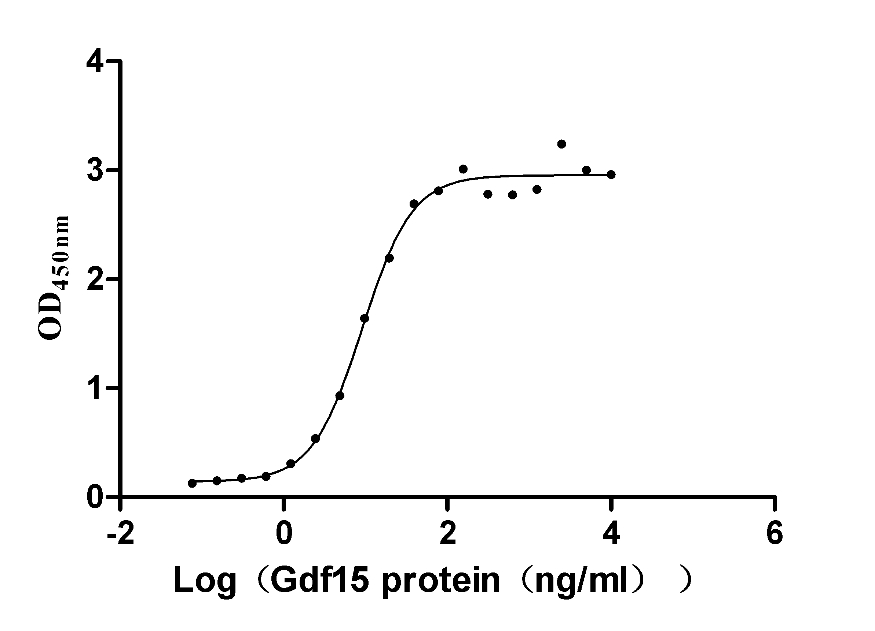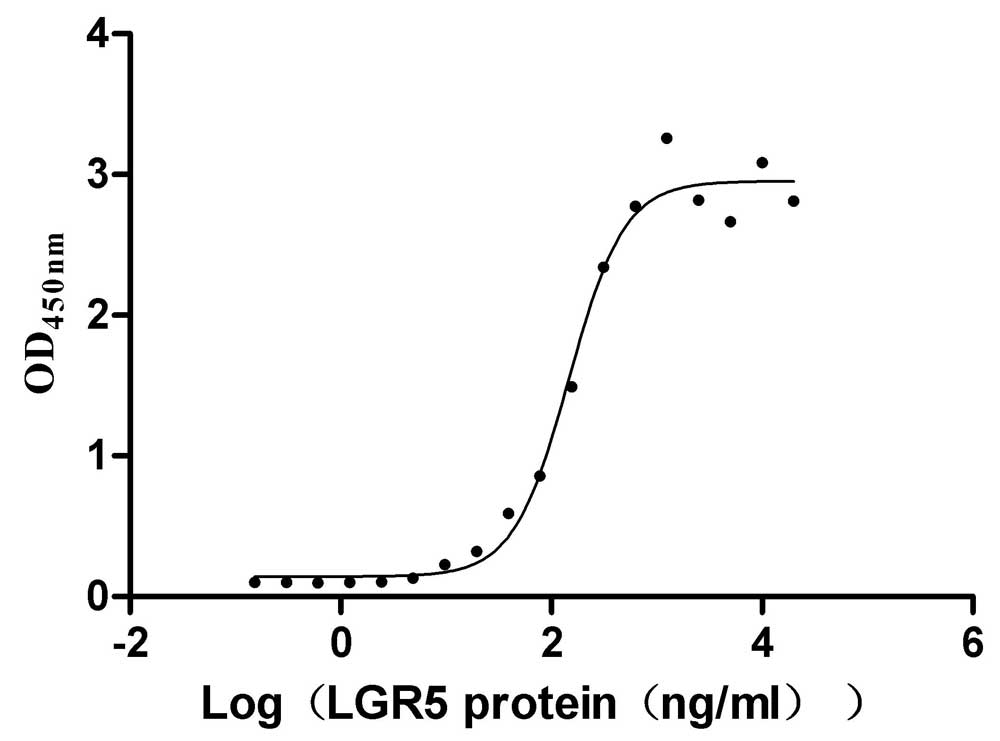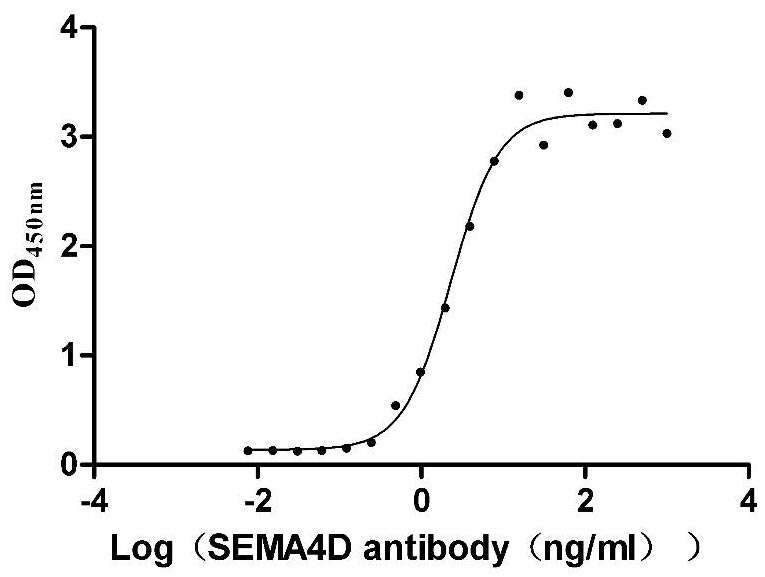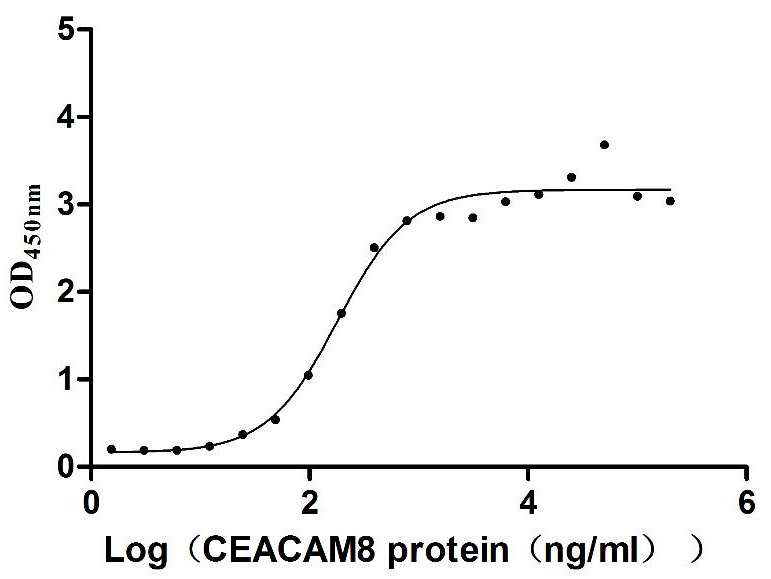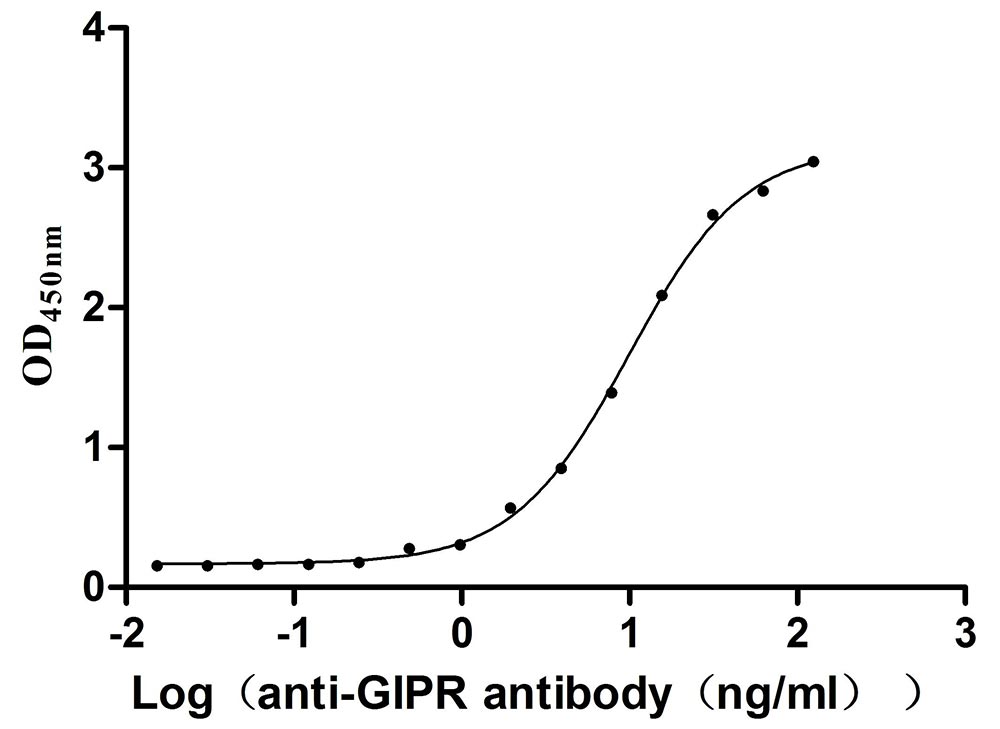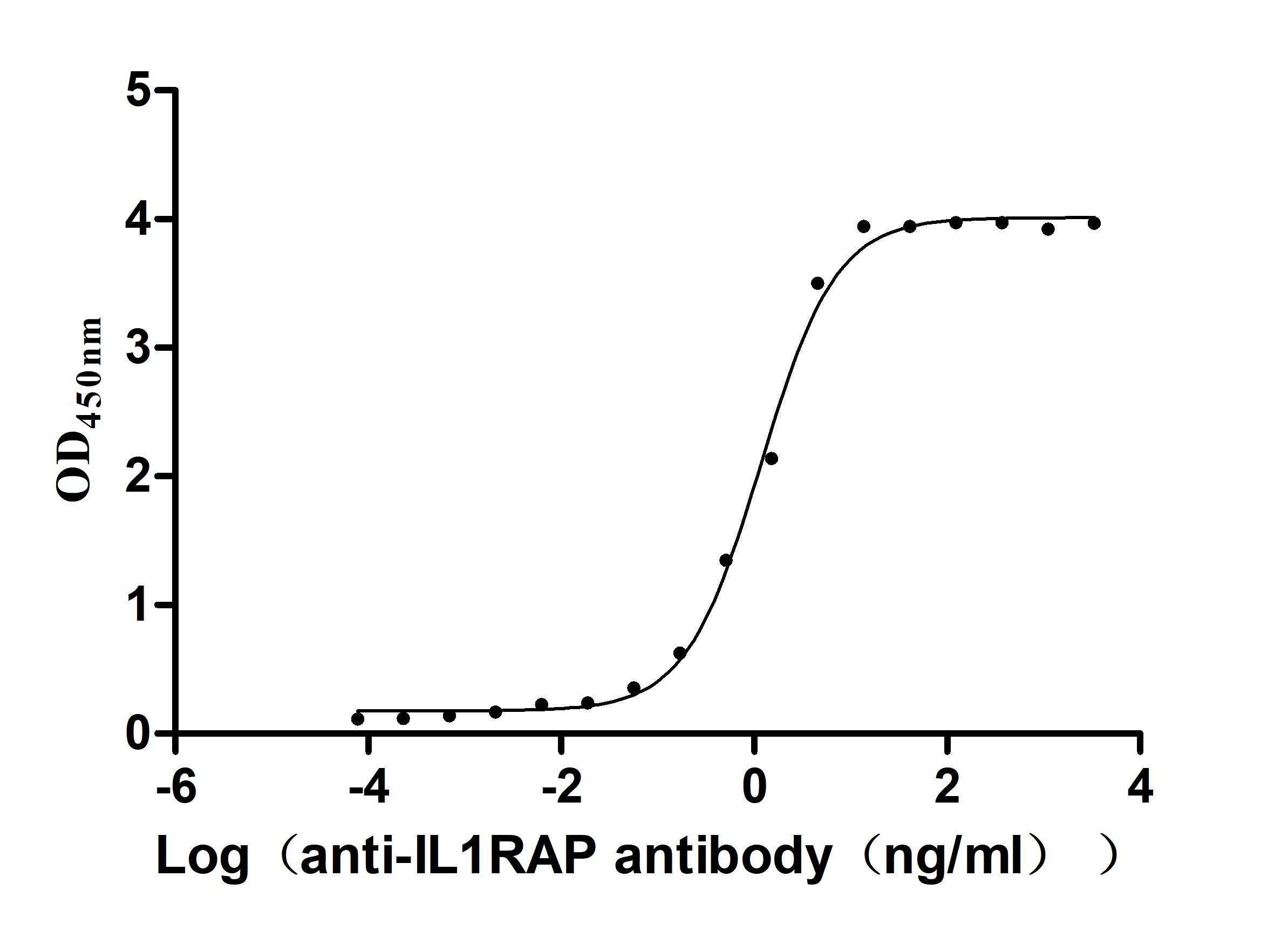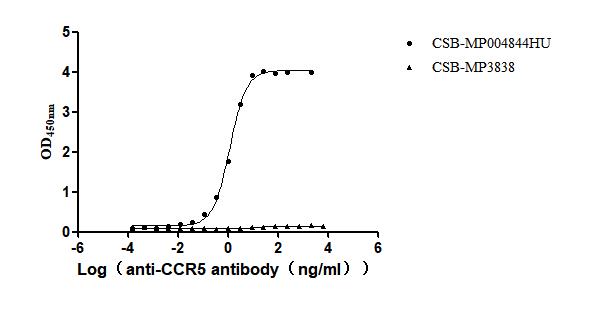Recombinant Mouse Myeloblastin (Prtn3)
-
货号:CSB-YP730722MO
-
规格:
-
来源:Yeast
-
其他:
-
货号:CSB-EP730722MO
-
规格:
-
来源:E.coli
-
其他:
-
货号:CSB-EP730722MO-B
-
规格:
-
来源:E.coli
-
共轭:Avi-tag Biotinylated
E. coli biotin ligase (BirA) is highly specific in covalently attaching biotin to the 15 amino acid AviTag peptide. This recombinant protein was biotinylated in vivo by AviTag-BirA technology, which method is BriA catalyzes amide linkage between the biotin and the specific lysine of the AviTag.
-
其他:
-
货号:CSB-BP730722MO
-
规格:
-
来源:Baculovirus
-
其他:
-
货号:CSB-MP730722MO
-
规格:
-
来源:Mammalian cell
-
其他:
产品详情
-
纯度:>85% (SDS-PAGE)
-
基因名:Prtn3
-
Uniprot No.:
-
别名:Prtn3Myeloblastin; EC 3.4.21.76; Proteinase 3; PR-3
-
种属:Mus musculus (Mouse)
-
蛋白长度:Full Length of Mature Protein
-
表达区域:30-250
-
氨基酸序列I VGGHEARPHS RPYVASLQLS RFPGSHFCGG TLIHPRFVLT AAHCLQDISW QLVTVVLGAH DLLSSEPEQQ KFTISQVFQN NYNPEENLND VLLLQLNRTA SLGKEVAVAS LPQQDQTLSQ GTQCLAMGWG RLGTQAPTPR VLQELNVTVV TFLCREHNVC TLVPRRAAGI CFGDSGGPLI CNGILHGVDS FVIRECASLQ FPDFFARVSM YVDWIQNVLR
-
蛋白标签:Tag type will be determined during the manufacturing process.
The tag type will be determined during production process. If you have specified tag type, please tell us and we will develop the specified tag preferentially. -
产品提供形式:Lyophilized powder
Note: We will preferentially ship the format that we have in stock, however, if you have any special requirement for the format, please remark your requirement when placing the order, we will prepare according to your demand. -
复溶:We recommend that this vial be briefly centrifuged prior to opening to bring the contents to the bottom. Please reconstitute protein in deionized sterile water to a concentration of 0.1-1.0 mg/mL.We recommend to add 5-50% of glycerol (final concentration) and aliquot for long-term storage at -20℃/-80℃. Our default final concentration of glycerol is 50%. Customers could use it as reference.
-
储存条件:Store at -20°C/-80°C upon receipt, aliquoting is necessary for mutiple use. Avoid repeated freeze-thaw cycles.
-
保质期:The shelf life is related to many factors, storage state, buffer ingredients, storage temperature and the stability of the protein itself.
Generally, the shelf life of liquid form is 6 months at -20°C/-80°C. The shelf life of lyophilized form is 12 months at -20°C/-80°C. -
货期:Delivery time may differ from different purchasing way or location, please kindly consult your local distributors for specific delivery time.Note: All of our proteins are default shipped with normal blue ice packs, if you request to ship with dry ice, please communicate with us in advance and extra fees will be charged.
-
注意事项:Repeated freezing and thawing is not recommended. Store working aliquots at 4°C for up to one week.
-
Datasheet :Please contact us to get it.
靶点详情
-
功能:Serine protease that degrades elastin, fibronectin, laminin, vitronectin, and collagen types I, III, and IV (in vitro). By cleaving and activating receptor F2RL1/PAR-2, enhances endothelial cell barrier function and thus vascular integrity during neutrophil transendothelial migration. May play a role in neutrophil transendothelial migration, probably when associated with CD177.
-
基因功能参考文献:
- Results provide evidence that proteinase 3 as a new factor involved in non-alcoholic fatty liver disease and insulin resistance. PMID: 27261776
- In different murine models of apoptotic cell injection, the PR3-induced microenvironment instructed pDC-driven Th9/Th2 cell generation. PMID: 26436651
- PR3-ANCA is a promising biomarker in primary sclerosing cholangitis. PMID: 25397578
- Proteinase 3-mediated caspase-3 activation controls neutrophil spontaneous death PMID: 25180606
- Increased PRTN3 activity was associated with development of autoimmune diabetes mellitus in NOD mice. PMID: 25092677
- Phagocytosis of apoptotic PR3-expressing cells potentiates proinflammatory cytokines in vivo by resident murine peritoneal macrophages. PMID: 22844112
- the dual functions (activation/termination) of PR3 in IL-33 biological activity. PMID: 22270365
- pathogenic effect of proteinase 3-specific antineutrophil cytoplasmic autoantibodies at local sites of inflammation. PMID: 15150076
- Murine and human proteinase 3 complexes have different interaction patterns with peptidic substrates. PMID: 18023421
- PR3 and neutrophil elastase enhance neutrophil-dependent inflammation by eliminating the local antiinflammatory activity of progranulin. Our results support the use of serine protease inhibitors as antiinflammatory agents. PMID: 18568075
- Neutrophil-derived PR3 can proteolyze high-molecular weight kininogen and liberate PR3-kinin, thereby initiating kallikrein-independent activation of the kinin pathway PMID: 19494315
显示更多
收起更多
-
亚细胞定位:Lysosome. Secreted. Cell membrane; Peripheral membrane protein; Extracellular side. Membrane raft; Peripheral membrane protein; Extracellular side.
-
蛋白家族:Peptidase S1 family, Elastase subfamily
-
数据库链接:
KEGG: mmu:19152
STRING: 10090.ENSMUSP00000006679
UniGene: Mm.2364
Most popular with customers
-
Recombinant Human Glucagon receptor (GCGR), partial (Active)
Express system: Mammalian cell
Species: Homo sapiens (Human)
-
Recombinant Mouse GDNF family receptor alpha-like (Gfral), partial (Active)
Express system: Mammalian cell
Species: Mus musculus (Mouse)
-
Recombinant Human R-spondin-1 (RSPO1), partial (Active)
Express system: Mammalian cell
Species: Homo sapiens (Human)
-
Recombinant Macaca mulatta Semaphorin-4D isoform 1 (SEMA4D), partial (Active)
Express system: Mammalian cell
Species: Macaca mulatta (Rhesus macaque)
-
Recombinant Human Carcinoembryonic antigen-related cell adhesion molecule 6 (CEACAM6) (Active)
Express system: Mammalian cell
Species: Homo sapiens (Human)
-
Recombinant Mouse Gastric inhibitory polypeptide receptor (Gipr), partial (Active)
Express system: Mammalian cell
Species: Mus musculus (Mouse)
-
Recombinant Human Interleukin-1 receptor accessory protein (IL1RAP), partial (Active)
Express system: Mammalian cell
Species: Homo sapiens (Human)
-
Recombinant Human C-C chemokine receptor type 5 (CCR5)-VLPs (Active)
Express system: Mammalian cell
Species: Homo sapiens (Human)



